Students Compete for Funding in Annual Entrepreneurship Competition
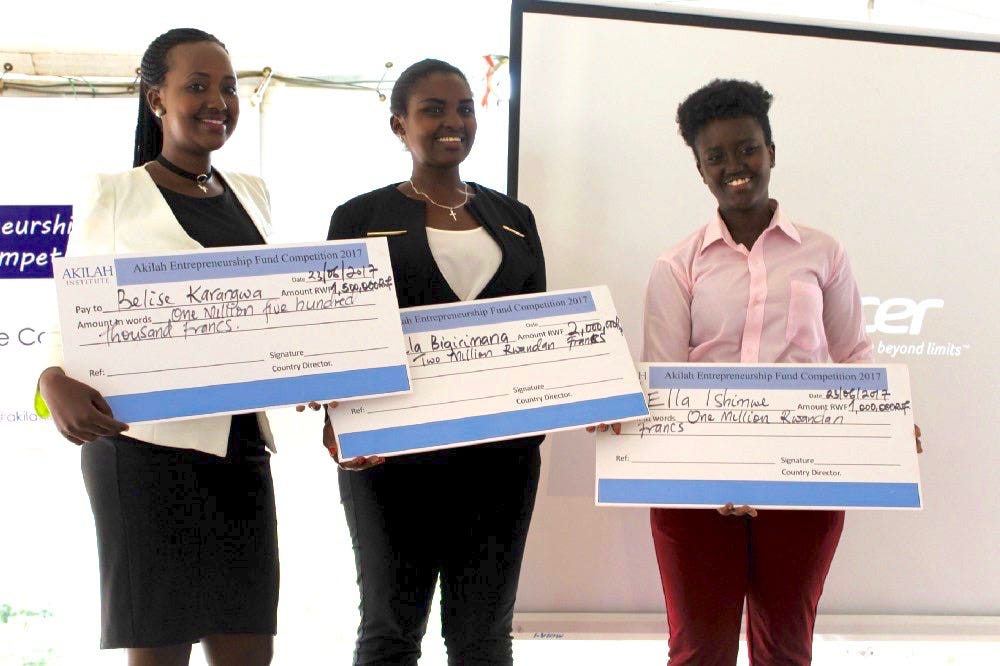
Winners of the Akilah Entrepreneurship Fund competition received seed funding and support from
Entrepreneurium , a local business incubator.
Three students were awarded a combined US$5,400 in seed funding during the third annual Akilah Entrepreneurship Fund competition.
The Akilah Entrepreneurship Fund competition is one of our favorite days of the year. This is when the entrepreneurial talent of our student body is on full display as final-year students present their most promising and innovative business ideas.
The competition provides seed funding to the three winners as well as external business development support to help students develop and expand their businesses after graduation.
The excitement and competition were high when this year’s six finalists pitched their businesses — or business ideas — to a jury of experts, external partners and guests, members of the media, and the Akilah staff and student body.
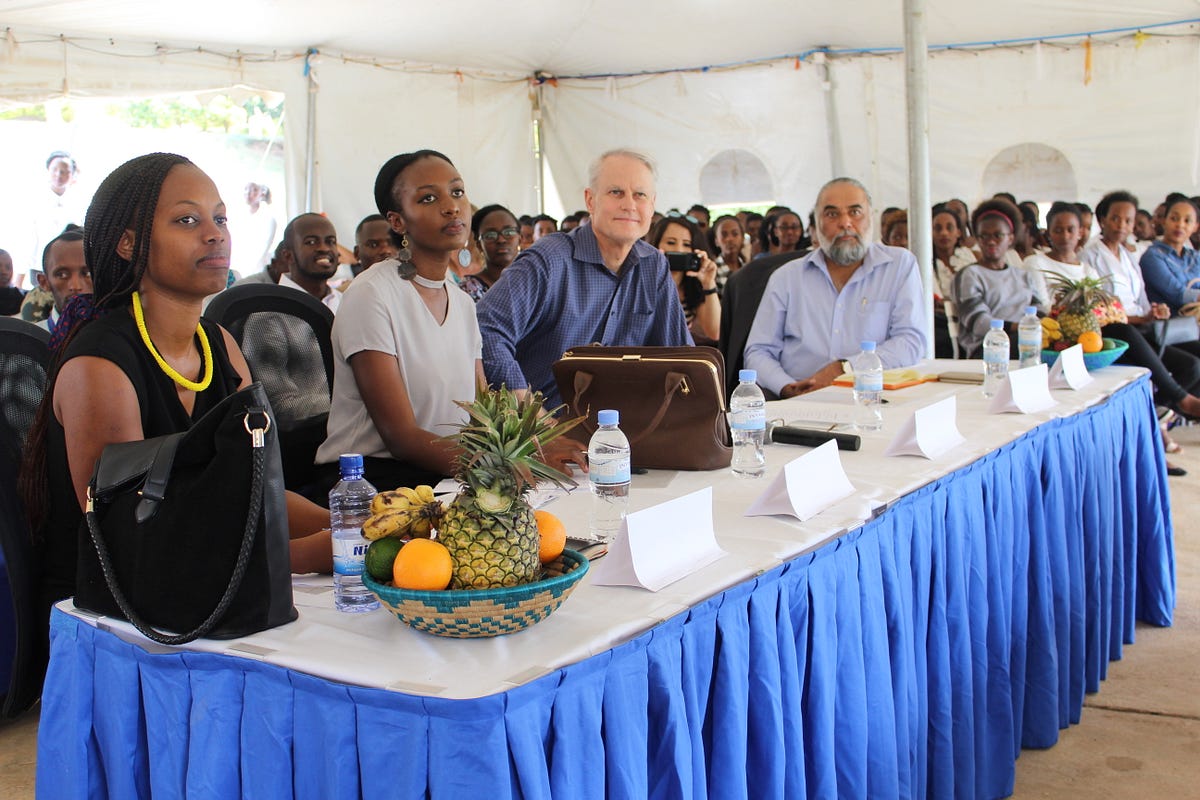
A panel of judges assessed the students’ business ideas.
From shoe import and production, to makeup services and event planning, to fish farming and a student savings group, to an online platform connecting potential students to universities — the student businesses represented a wide range of diversity, innovation, and ambition.
This year, the competition was not limited to our Entrepreneurship program students but open to students from all three diploma programs. Some competitors developed their businesses alone, while others formed teams within and across diploma programs. All six businesses are members of Akilah’s in-house Business Incubation Center, which helps students refine and commercialize their innovations.
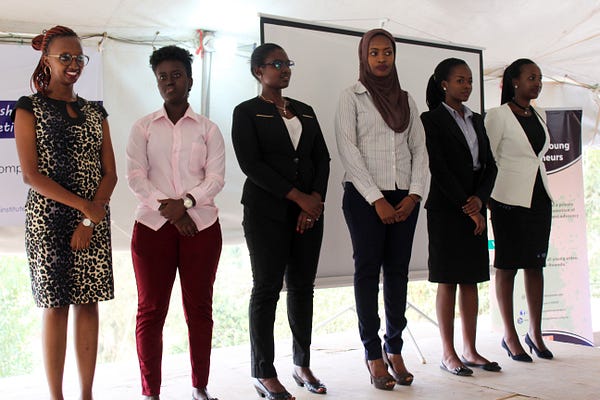
Students from all diploma programs were eligible to compete in this year’s competition.
After months of developing a business model, creating a budget, and assessing their competitive advantage, the six student entrepreneurs pitched their ideas to a cheering audience and a tough and attentive panel of judges from the private sector. Judges included Karanvir Singh, the CEO and founder of Yego Innovation, and Priscilla Ruzibuka, founder of Ki-pepeo Kids Clothing.
A loan fund for students
Pamela Birigimana took home this year’s grand prize with her student savings and loan business. She will graduate from Akilah’s Entrepreneurship program this November.
Pamela transferred from our Burundi campus in 2015 and learned from her own experience the challenge of accessing finance without a strong network around you.
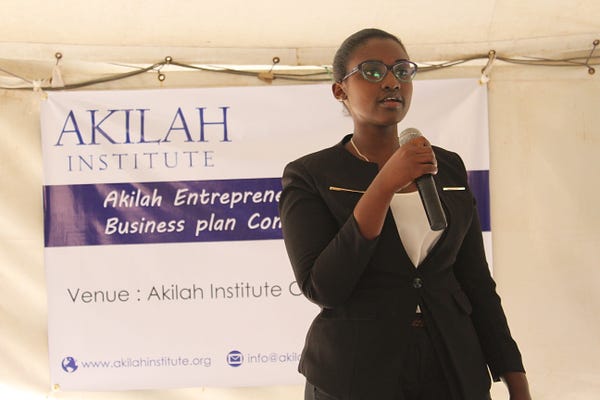
Pamela won first place with her idea to start a savings and loan group for students.
“Last year, I fell sick and I couldn’t afford to go to the hospital. I had to stay home for more than a week, and it affected my academic performance. It inspired me to start a student savings and lending group so other students would not have the same problems as me when falling sick, paying tuition, paying rent, or dealing with emergencies,” Pamela explained in her eight-minute pitch to the judges.
Pamela’s project has already disbursed loans to more than 25 students from different universities, ranging from US$20 to US$120, which they pay back after a month with 20% interest. The next step for Pamela and her partners is to officially register as a cooperative and scale up their operations.
Pamela’s winning idea was awarded nearly US$2,400 to kickstart her business along with support from Entrepreneurium, a local business incubator.
The two runners-up, Ella Stella Ishimwe and Belise Karangwa, have good reasons to celebrate too. After impressing the judges, they each walked away with funding and access to Entreprenarium’s services.
First-class footwear
“Rwanda is developing into a middle-income country, and the needs of the population are following. People want quality, affordability, and different designs. We’re providing high-quality, affordable shoes for these people,” said Belise Karangwa in her pitch for First Class Shoes. The business, which retails footwear, came in second overall. Belise has been running First Class Shoes for six months and has sold over 270 pairs of men’s shoes, mostly imported from outside Rwanda.
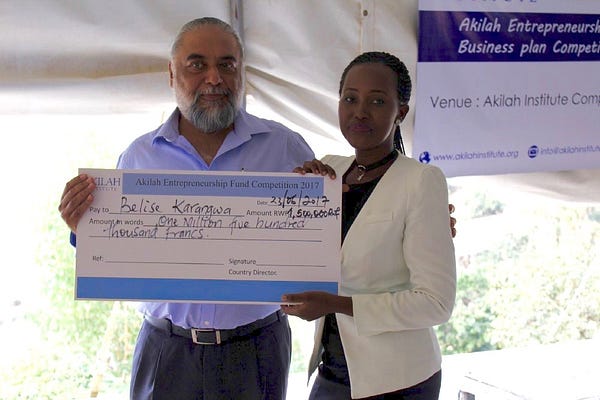
Belise, right, received seed funding to launch a line of leather shoes made in Rwanda.
In her pitch, Belise outlined plans to shift away from imports to produce her own brand of shoes. Her business strategy aligns with a national push to promote Made in Rwanda products and helped secure her a third-place win. Belise was awarded US$1,800 in seed capital to see her plans through. She will use the prize money to scale production and launch a new brand of quality leather shoes made in Rwanda.
Connecting students to universities
Ella Stella’s business, U-Connect, is an online platform that aims to connect high school graduates with private universities and makes the matching process easier on both ends.
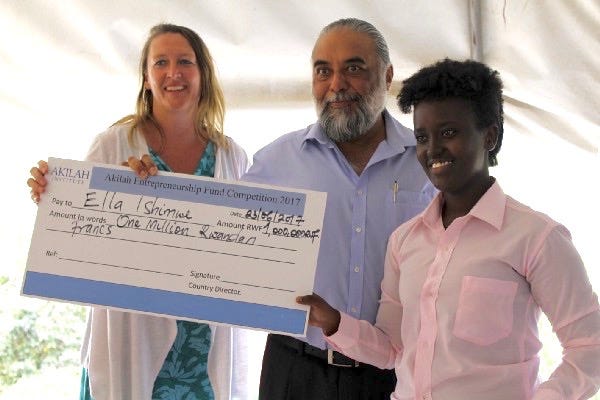
Ella Stella, right, pitched an online platform to connect secondary school students with universities.
“Do you know that feeling of not having any idea how to find the right university of your choice? Where do you get information, how do you find out which of them suits you? We have the solution,” Ella Stella and her partner, Phyllis Kabano, told the crowd. By charging universities for advertising and matching, U-Connect can offer services to prospective students free of charge and still make a profit.
Ella Stella walked away with US$1,200 to build U-Connect into a bona fide business.
For the third year in a row, Akilah’s Entrepreneurship Fund competition raised the bar for entrepreneurial talent and ambition among our students. Congratulations to all six contestants!
